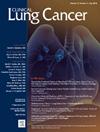Regimen Selection for Chemoimmunotherapy in Nonsquamous Non–Small Cell Lung Cancer with Low PD-L1 Expression: A Multicenter Retrospective Cohort Study
IF 3.3
3区 医学
Q2 ONCOLOGY
引用次数: 0
Abstract
Background
Although chemoimmunotherapy is recommended for advanced nonsquamous non–small cell lung cancer (NSCLC) with low programmed cell death ligand 1 (PD-L1) expression, no head-to-head comparisons of immune checkpoint inhibitors (ICIs) have been performed. Therefore, we compared the effect and safety of regimens in these patients to guide evidence-based treatment.
Methods
This retrospective study included patients with advanced nonsquamous NSCLC with a PD-L1 tumor proportion score of 1% to 49% administered ICI combination platinum-based chemotherapy between May 2018 and May 2023 at 19 institutions in Japan. The main analysis compared survival outcomes and the incidence of grade ≥3 adverse events among regimens.
Results
Among 316 included patients (median [range] age, 69 [36–89] years; 242 males; 41 never smokers), 200 (63%), 68 (22%), and 48 (15%) received chemotherapy combined with anti-programmed cell death protein 1 (PD-1), anti-PD-L1, and anti-PD-1/cytotoxic T-lymphocyte associated protein 4 (CTLA-4) antibodies, respectively. The median overall survival times were 28.6, 23.1, and 24.4 months (P = .41), and the median progression-free survival times were 9.4, 7.2, and 8.7 months (P = .28) in the anti-PD-1/Chemo, anti-PD-L1/Chemo and anti-PD-1/CTLA-4/Chemo groups, respectively. The anti-PD-1/CTLA-4/Chemo group had the lowest incidence of hematologic toxicity (P = .13) and the highest incidence of nonhematologic toxicity (P = .07). The incidence of grade ≥3 pneumonitis was significantly lower in the anti-PD-L1/Chemo group (P = .049).
Conclusions
Despite comparable survival benefits, adverse events differed among three regimens in patients with low PD-L1 expression. Notably, anti-PD-L1 antibody combination chemotherapy may reduce the risk of severe pneumonitis.
低PD-L1表达的非鳞状非小细胞肺癌的化疗免疫治疗方案选择:一项多中心回顾性队列研究
背景:尽管化疗免疫治疗被推荐用于低程序性细胞死亡配体1 (PD-L1)表达的晚期非鳞状非小细胞肺癌(NSCLC),但尚未进行免疫检查点抑制剂(ICIs)的头对头比较。因此,我们比较了这些患者的治疗方案的效果和安全性,以指导循证治疗。方法:本回顾性研究纳入了2018年5月至2023年5月在日本19家机构接受ICI联合铂基化疗的PD-L1肿瘤比例评分为1%至49%的晚期非鳞状NSCLC患者。主要分析比较了不同方案的生存结局和≥3级不良事件的发生率。结果:纳入的316例患者(年龄中位数[范围]69岁[36-89]岁;242男性;41例从不吸烟)、200例(63%)、68例(22%)和48例(15%)分别接受了联合抗程序性细胞死亡蛋白1 (PD-1)、抗pd - l1和抗PD-1/细胞毒性t淋巴细胞相关蛋白4 (CTLA-4)抗体的化疗。抗pd -1/Chemo、抗pd - l1 /Chemo和抗pd -1/CTLA-4/Chemo组的中位总生存时间分别为28.6、23.1和24.4个月(P = 0.41),中位无进展生存时间分别为9.4、7.2和8.7个月(P = 0.28)。抗pd -1/CTLA-4/Chemo组血液学毒性发生率最低(P = 0.13),非血液学毒性发生率最高(P = 0.07)。抗pd - l1 /Chemo组≥3级肺炎的发生率显著降低(P = 0.049)。结论:尽管在低PD-L1表达的患者中,三种方案的不良事件有所不同。值得注意的是,抗pd - l1抗体联合化疗可降低严重肺炎的风险。
本文章由计算机程序翻译,如有差异,请以英文原文为准。
求助全文
约1分钟内获得全文
求助全文
来源期刊

Clinical lung cancer
医学-肿瘤学
CiteScore
7.00
自引率
2.80%
发文量
159
审稿时长
24 days
期刊介绍:
Clinical Lung Cancer is a peer-reviewed bimonthly journal that publishes original articles describing various aspects of clinical and translational research of lung cancer. Clinical Lung Cancer is devoted to articles on detection, diagnosis, prevention, and treatment of lung cancer. The main emphasis is on recent scientific developments in all areas related to lung cancer. Specific areas of interest include clinical research and mechanistic approaches; drug sensitivity and resistance; gene and antisense therapy; pathology, markers, and prognostic indicators; chemoprevention strategies; multimodality therapy; and integration of various approaches.
 求助内容:
求助内容: 应助结果提醒方式:
应助结果提醒方式:


